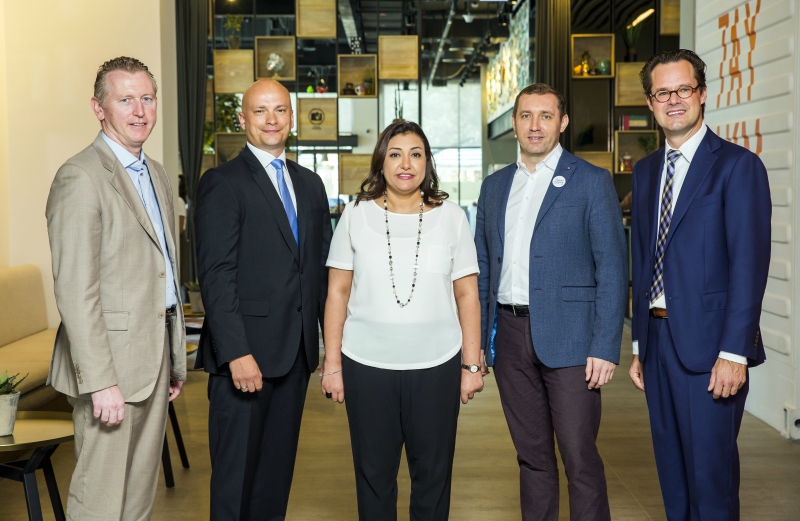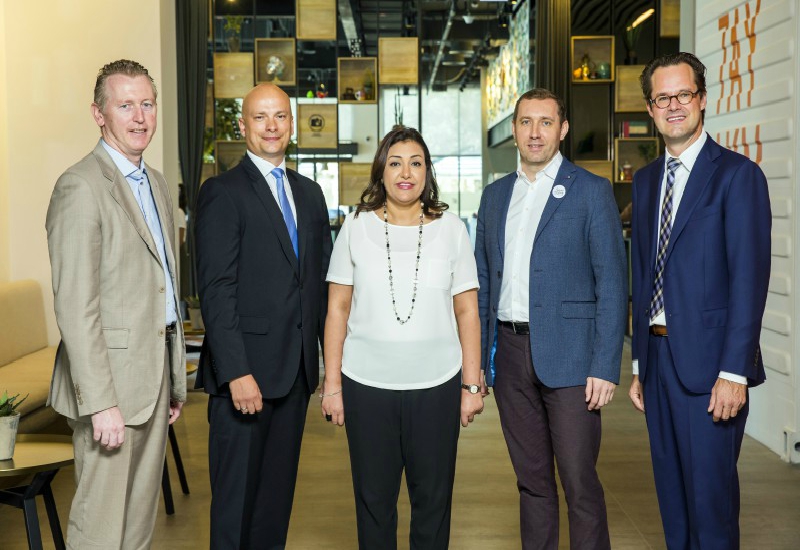Five leaders in the Middle East's mid-market hospitality industry convened at the Rove Trade Centre in Dubai to discuss relevant issues facing the sector, with the hoteliers' insights helping to set the 2017 Hotelier Express Summit agenda.
Which destinations in the region offers expansion opportunities for the mid-market hotel sector?
Pawel Guminski: For Premier Inn, a significant market for expansion is Saudi Arabia, of course. Obviously, UAE stays on top of the agenda with Al Jaddaf and Dragon Mart opening and Al Maktoum airport in a year and a half.
Ghada Mahgoub: For Time Hotels, we are looking at expansion here in Dubai but also in Saudi Arabia and Jordan.
Remmie De Graaf: At Hilton, there is also a trend to focus more on the mid-scale segment, which came over from the US and is now in the Middle East and moving towards Asia. As Paul [Bridger, Rove Hotels director of operations] has mentioned, mid-scale does not automatically mean that the guest does not have the money but that they tend to spend more on other aspects. They budget differently. So the mid-scale is increasing in popularity. Hilton Garden Inn is looking into Oman and in Dubai as well, where we already have three Hilton Garden Inns. Also Hampton Inn will be coming onboard very soon and that growth will continue very strongly in the Middle East.
Siegfried Poppe: Historically, there was a scarcity in the mid-market, in terms of availability and quality of product. Dubai as a hub for developing mid-scale brands is great. It’s on the top five rated cities in the world. It’s a hub that can showcase new trends. And you have so many visitors from Gulf countries coming to Dubai, including investors who come and say, ‘Oh this actually works. It’s a consistent product and customers are buying it.’ So that helps to develop the concept in the minds of investors and developers. I think the investors who want a mid-scale product these days, they know what they want and they know what they are going to get. There are investors who are not that knowledgeable about it, but when they experience the product firsthand, they get what you’re trying to deliver. For example with a big company like Hilton, you can easily shift and say, 'This is a Waldorf, this is a Hilton Garden Inn', and you show them the metrics and they understand the value of each component, and explain why you’re segmenting the market, from upper scale to mid-scale, then they understand.
De Graaf: With owners, they know fairly well in general the direction where they want to go and they also have different aims as to why they would want a certain brand, a certain product. The mid-scale to them is very clear. It is more the public, where I feel in most cases, there is still some education work to do.
Paul Bridger: For us as a homegrown brand in Dubai, it makes sense for us to start in Dubai and make our footprint in Dubai. We believe there is huge potential in the emerging markets particularly in KSA – a growing middle class, people who are doing lots of travelling, whether for business, leisure and we are actively pursuing the right opportunities in these markets. We will be announcing in the not too distant future the inroads for Rove in these markets. To your point, when people have travelled from these countries to Dubai, they already get the brand, they understand the product and service offering so you already have ambassadors who get the concept.
Poppe: We are looking at possible expansion in eastern Africa. We see that there are very good opportunities out there. As already mentioned, there are very educated investors in these markets who know exactly what is a mid-scale brand, and once you bring it down to numbers and what you want to deliver, for the growing demand of those products – they understand the figures. They also understand that it is a trend, the buying power, if you look at this region, the buying power of customers has changed. And how people are allocating the money, to your point as well. There are new trends coming so the product you have to deliver to the customer has to change.
Bridger: It’s not just about the investors, it’s about the consumers. The consumers from these countries, they want to travel and they spend US$80, $100 on accommodation. There’s a demand for it. So it’s consumers first, then the investors follow because they see the opportunity.
Poppe: Our brand stands for customisation. What it allows is that you really can go into any market, pick and choose the services which are really relevant in this market, the specific customer base that you’re going to have in that specific property and adapt it. It’s in constant modification, it’s not something that’s a set standard. It’s more modulable, which is again, also a customer trend. People want to be in control of their purchasing power. They want to control the experience. When you look at the trend of experiential travel, it’s the same. But if you give them the tools to control the experience, I think that’s something very human. And if you go across regions and countries, habits change so there is a higher adaptability.
Bridger: I think that’s becoming more and more important. You come into Rove now and you’re connected to the Dubai community and you go to Saudi Arabia and you’ll have local artists and connection with that immediate community. You see it in the luxury experience and you’ll see it more and more with the mid-scale category, lifestyle, whatever you want to call it. It doesn’t cost a lot more to build a hotel that caters more to that consumer. The same thing is happening with F&B. If you go to a restaurant that represents that community, you want to have food that represents that community.
De Graaf: You need to customise for the local market but you also need to guarantee the consistency of the brand, the element of trust that guests look for.
For more on the insights and recommendations revealed by the members of the Summit 2017 advisory panel, read the September 2017 issue of Hotelier Express.
Hotelier Express would like to thank the members of the Summit Advisory Panel 2017:
Time Asma Hotel, Dubai general manager Ghada Mahgoub
Rove Hotels director of operations Paul Bridger
Hilton Garden Inn Ras Al Khaimah general manager Remmie de Graaf
Premier Inn Dubai International Airport Hotel & Premier Inn Al Jaddaf general manager Pawel Guminski
Smartotels Hospitality International chief operating officer Siegfried Poppe
EVENT INFORMATION
Hotelier Express Summit 2017
Wednesday, 22nd November
Grosvenor House, Dubai, UAE
A one-of-a-kind event that brings together hospitality professionals from across the Middle East’s midlevel, budget and serviced apartment market to discuss and debate the unique challenges and opportunities this sector possesses. The Hotelier Express Middle East Summitprovides the ideal forum for hoteliers to step back and reflect on how they are going to tackle key operational challenges, meet customer expectations and boost their bottom line.
CONTACT DETAILS:
For event registration or speaking opportunities, contact Louby Maktari, conference producer:
Email: louby.maktari@itp.com
Tel: +971 4 444 3578
For event sponsorship opportunities, contact Stephen Price, group sales director:
Email: stephen.price@itp.com
Tel: +971 4 444 3246

| Advertisement |











 Search our database of more than 2,700 industry companies
Search our database of more than 2,700 industry companies









